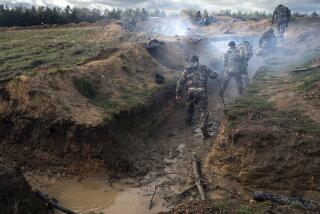U.N. Forces in Croatia as Battles Rage : Yugoslavia: Over 1,200 French troops arrive. Meanwhile, new violence erupts among ethnic rivals in the former federation.
- Share via
BIHAC, Yugoslavia — The first big contingent of U.N. peacekeeping troops arrived in Croatia on Saturday as a shadow was cast on its mission by major new outbreaks of fighting in scattered areas of Croatia and here in newly independent Bosnia-Herzegovina.
Bosnian President Alija Izetbegovic mobilized his military and police reservists after an invasion of Serbian guerrillas left more than two dozen people dead in a northern city of the former Yugoslav republic.
Sarajevo television reported as many as 200 casualties in another inter-ethnic clash in the town of Kupres, west of Sarajevo, but a later broadcast appeared to back down from that astonishing figure, mentioning only fierce fighting in the region.
Intensified attacks in the Croatian city of Osijek and in various other points of severe ethnic tension in Croatia were also reported as more than 1,200 French troops, wearing the blue berets that distinguish the U.N. forces, landed in the Croatian port of Rijeka on the Adriatic Sea.
Lt. Gen. Philippe Morillon, deputy commander of the force, told the troops: “What an enormous hope your arrival creates in a country in which the vast majority of the population wants peace.”
The French troops leave today for the Croatian capital of Zagreb and the republic’s southern Krajina region, most of which is now controlled by ethnic Serbs who have been battling Croatia since it became independent of Yugoslavia last summer.
A Belgian battalion of the U.N. force is scheduled to arrive Monday in the Baranja region, where the Serb-led federal army said Saturday that 25 army reservists died in Croatian attacks Thursday and Friday.
At least 10,000 people are estimated to have been killed during nearly 10 months of civil warfare. Frequent outbreaks of fighting continued even after a cease-fire effective Jan. 3 paved the way for assignment of the U.N. peacekeepers.
An advance detachment of peacekeepers has been here for weeks, and more than 14,000 are scheduled to be in place by the end of this month.
The renewed violence of recent days appeared to be caused by Serbian and Croatian forces attempting to strengthen their grip on contested territories ahead of the U.N. intervention.
The deployment plan negotiated by special U.N. envoy Cyrus R. Vance, a former U.S. secretary of state, implies that the peacekeepers will ensure the administrative status quo, giving both sides an incentive to take as much land as possible before the foreign forces are in place.
Unrest in Bosnia, a multiethnic republic where no single nationality makes up a majority, has been intensifying over the past few days.
The attacks openly carried out by Serbian irregulars are seen as intended to discourage the European Community from recognizing Bosnia-Herzegovina’s independence from the now-shattered old Yugoslav federation.
Foreign ministers of the 12-nation EC meet Monday to consider Bosnia’s plea for recognition of the statehood it proclaimed late last year and validated with a referendum last month.
President Izetbegovic appeared on television to warn his republic of 4.4 million that the Yugoslav federal army had failed to protect the citizens of Bosnia-Herzegovina from invasion and massacre.
At least 25 people--mostly Muslims--were reported killed in the city of Bijeljina, near the border with Serbia, on Friday and Saturday.
Izetbegovic, who had previously appealed for tolerance and passive resistance, said he feared he has erred in advising concessions and called for mobilization of all republic fighting forces.
The Pan-Yugoslav television network YUTEL carried videotape footage from Veljina, where Serbian fighters under the command of a Belgrade underworld figure known as Arkan had overrun the city, claiming to be liberating it exclusively for the Serbs.
Arkan, whose real name is Zeljko Raznjatovic, told reporters that his forces are in Bosnia to prevent Muslim fundamentalism from gaining a foothold in Europe.
Bosnia, like Croatia before it, has become the scene of repeated Serbian insurrections backed by the federal army and free-lance guerrillas, with the result being increasing territory falling to Serbian rule.
Serbia’s authoritarian Communist President, Slobodan Milosevic, rose to power by promising that all Serbs would continue to live in one state despite the secession movements of rival Croatia and other republics.
Serbs have long been the largest ethnic group in Yugoslavia, accounting for about 37% of the 24 million population before the Balkan federation was broken up by secessions that began with the independence of Croatia and Slovenia on June 25, 1991.
But about 3 million Serbs live in republics other than Serbia, and Milosevic’s vow to preserve unity has encouraged Serbian enclaves in Croatia and Bosnia to rebel against the independence of those republics.
The EC recognized the sovereignty of Croatia and Slovenia in January, but Bosnia has been denied equal treatment because of a series of technical and administrative delays.
Extreme elements of the Serbian population in Bosnia have been trying to delay recognition to allow time for more territory to be taken under Serb or federal army control.
Serbs account for about 31% of Bosnia’s population, with Muslims being the largest group with 44% and Croats accounting for about 17%.
More to Read
Sign up for Essential California
The most important California stories and recommendations in your inbox every morning.
You may occasionally receive promotional content from the Los Angeles Times.














